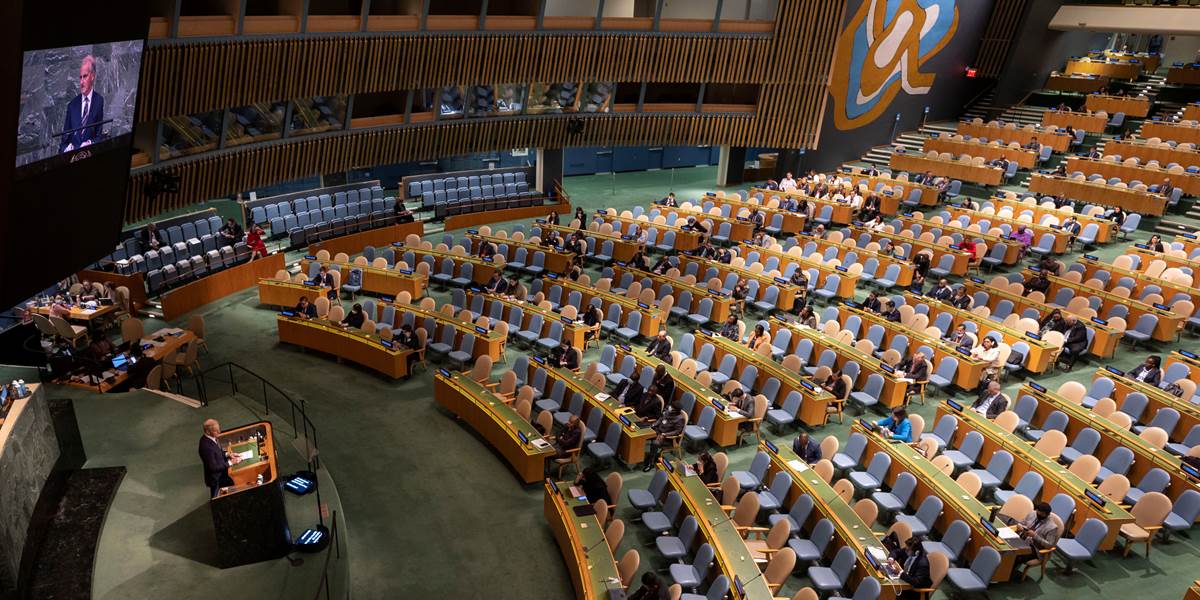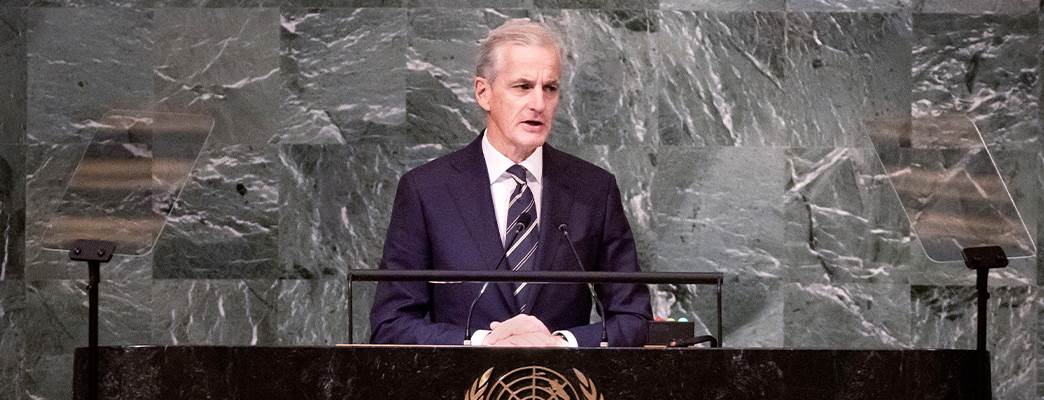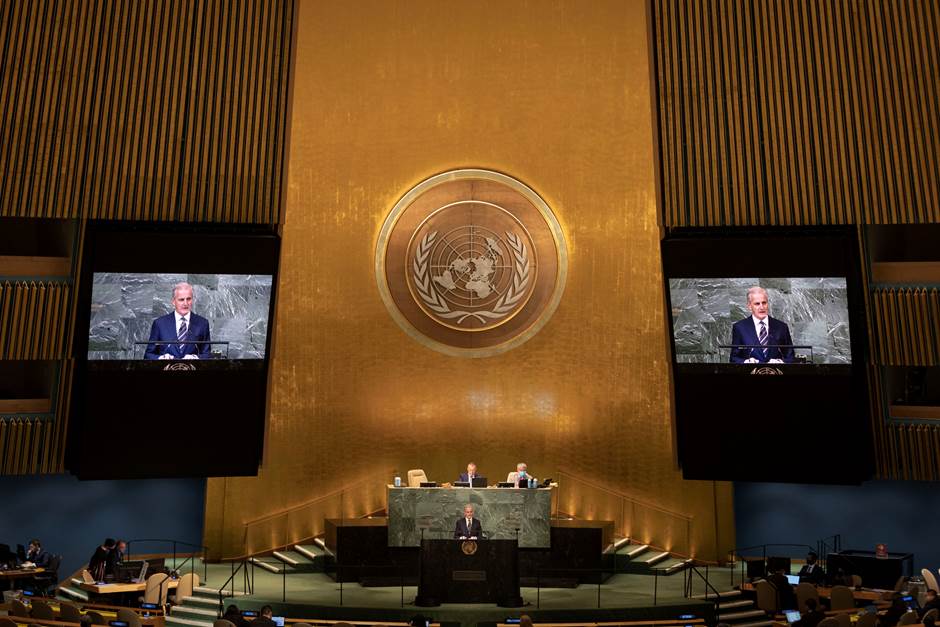At the beginning of a new session in the General Assembly, Member States are invited to participate in the General Debate, providing an opportunity to raise topics that will be key to address the coming session.
Norwegian Prime Minster Jonas Gahr Støre delivered Norway's national statement in the General Debate of the 77th session of the UN General Assembly. Read it in full here:
President, Secretary General, Excellencies, Ladies and gentlemen. We live in challenging times. As a global community we face dire consequences from war, climate change, the pandemic, food insecurity and inequality.
Check against delivery
The Secretary-General underlined this eloquently in his address on Tuesday: we have the values and principles necessary to deal with these challenges: they are enshrined in the Charter of the United Nations.
No country is unfaced by these challenges. And we can only successfully respond to them together.
That is precisely why we have the United Nations. The UN was born out of crisis, to unite strength and enable nations to raise above narrow self-interests and find common ground. This is what we need to turn to again.
The UN Charter sets out clear principles for a rules-based international order. This rules-based order is under attack.
February 2022 ushered in what we hoped we would never witness again - a new large-scale war in Europe.
Russia’s unprovoked attack on Ukraine has led to massive suffering, large-scale humanitarian needs and destruction of civilian infrastructure. Russia bears sole responsibility for the war and its consequences. And Russia is responsible for bringing it to an end.
Russia’s actions are in blatant breach of the UN Charter - and therefore something that concerns us all.
The war is also having devastating global consequences.
It has undermined multilateral cooperation when we need it the most.
It has accelerated a negative economic spiral and jeopardised the 2030 Agenda.
We are all feeling the repercussions of the war: energy supply is under pressure; inflation is soaring; and food insecurity has increased dramatically.
Ordinary people across the globe – not least people in developing countries – are paying the price.
The war is amplifying other crises, and compounding the impacts of climate change and armed conflict in other parts of the world:
The Horn of Africa is faced with its worst drought in more than four decades.
Pakistan is contending with devastating floods.
More than 300 million people affected by conflicts and humanitarian crises are in need of humanitarian assistance and protection.
In many armed conflicts, there is a lack of respect for international humanitarian law, and civilians are paying the price.
A few years ago, it appeared that hunger would soon be a scourge of the past. Now food insecurity is on the rise.
No continent is more vulnerable to the combined effects of climate change, conflicts and growing food insecurity than Africa.
Norway stands in solidarity with the people grappling with these interlocking crises.
We have allocated more funding to humanitarian assistance and development cooperation in 2022 than ever before.
President,
The war of aggression against Ukraine is a challenge to the norms at the foundation of the United Nations. We are standing up to confront that challenge.
Some hold the conviction that authoritarian regimes are strong, while democracies are frail, and likely to crack under pressure. We are proving them wrong.
Together with a strong alliance of partners, we are standing with Ukraine and aid its self-defence. As Europe’s largest supplier of energy, we do what we can to enhance Europe’s resilience.
President,
We are standing up for human rights and fundamental freedoms elsewhere.
Norway will continue to promote civic space, protect human rights defenders and support media diversity and independent journalism worldwide.
Women’s and girls’ participation in society and their right to decide over their own bodies are essential for democratic and sustainable development, not least in times of conflict and war. Safeguarding these human rights remains one of our top priorities.
While supporting Ukraine, we must not forget conflicts elsewhere. Norway is continuing its peace diplomacy and peacebuilding efforts in major conflicts across the globe.
As part of our longstanding engagement in the Middle East, we are pushing for an end to the Israeli-Palestinian conflict, including a viable two-state solution.
In Colombia, the new Government has expressed its commitment to implementing the peace agreement with the FARC, and to initiating formal negotiations with the ELN guerrilla group. The ELN also seems inclined to renew dialogue.
As a guarantor country, Norway remains committed to Colombia’s quest for peace, and to supporting the parties in this endeavour.
In all the peace processes Norway is engaged in, we promote active involvement and participation by women in line with the women, peace and security agenda.
We talk to all parties as we work to achieve peaceful conflict resolution. Without dialogue, we have no opportunity to influence the parties and encourage them to move in a more positive direction.
Norway also strongly supports the good offices of the Secretary-General in conflicts worldwide. We commend him and his dedicated team for their important work on the Black Sea Grain Initiative - and Türkiye for its important contribution.
The prices of food, fuel and fertiliser were already high before the war in Ukraine, but the war has dramatically exacerbated the situation.
If the global community does not act swiftly, the current food price crisis will develop into a food availability and food supply crisis, and that is too serious.
Together with fighting climate change, Norway has placed food security at the top of its development agenda. This year we are allocating more than 300 million dollars in funding for food security initiatives alone.
We need to:
increase humanitarian assistance and enhance social safety nets;
promote local food production in the Global South;
secure access to seeds, fertilisers, and technology for small-scale farmers; and
accelerate the transformation to climate-resilient and sustainable food systems.
In all of this, we must ensure that the needs of women and girls are adequately integrated.
We are all dependent on a collective response if we are to succeed in addressing climate change and the loss of biodiversity. Currently we are not on track, and this speed needs to change.
Norway will honour its commitment to cut greenhouse gas emissions and to play a key role in the green transition.
We have listened to the concerns of developing countries. And we have decided to double our climate finance to these countries by 2026. Within this target, we aim to at least triple our funding for climate adaptation and resilience.
Climate change affects millions of people worldwide and increases the needs of vulnerable people. The current humanitarian system will not be able to meet the increasing humanitarian needs.
As global warming continues, weather and climate extremes will increasingly have an impact on armed conflict. Climate and security are already closely interlinked.
The fight against climate change requires new, innovative approaches, and we must do what we can to make the upcoming COP27 a success. Norway will not rest before that summit. The Global Energy Alliance for People and Planet brings together private and public resources.
As co-chair, Norway will work with partners across the Global South to support renewable energy transitions, reduce greenhouse gas emissions, increase clean power, and create green jobs.
The oceans can be a vital part of the solution to climate change, food insecurity and poverty. If adequately managed and protected, the oceans hold the key to reaching many of the Sustainable Development Goals. But SDG14 is the most underfunded. That is why Norway is pushing for change here.
The High-level Panel for a Sustainable Ocean Economy, co-chaired by Norway, is an initiative by world leaders committed to ocean health and ocean wealth, in support of the 2030 Agenda.
The Panel members have committed to sustainably manage 100% of the ocean areas under their national jurisdiction. We will establish Sustainable Ocean Plans and urge other coastal states to do the same.
The fifth session of the UN’s Environmental Assembly, was an important breakthrough for multilateral cooperation on environmental issues. Norway will work to ensure an effective agreement on combating plastic pollution through a life-cycle approach.
We must not overlook existing crises as new ones emerge. The pandemic is not over. We cannot go from COVID-19 panic to COVID-19 neglect. We must use the lessons learned from COVID-19 and the ACT Accelerator. This will be key to preventing, preparing and responding to new outbreaks of infectious disease.
President,
Russia’s unlawful act of aggression against Ukraine heightened geopolitical tensions and posed obstacles to multilateral cooperation. That is serious.
As a Security Council member, Norway has consistently sought to strengthen the Council’s mandate to maintain international peace and security.
And despite increased geopolitical tensions, the Security Council has retained its ability to adopt important resolutions.
We secured a robust mandate for the UN in Afghanistan. Together with Niger, we negotiated a ground-breaking resolution on the protection of education in armed conflict. And we partnered with Ghana on a resolution on maritime security in the Gulf of Guinea.
President,
In times of crisis and rising global tensions, we all feel the pressure to put domestic concerns before global solidarity.
In times of distress it is only natural for political leaders to try to look after their own populations.
But there is no contradiction between this and engaging with the rest of the world. Quite the contrary.
We are bound together, we are dependent on each other and we have a shared destiny.
Without a strong and effective UN, the international community will not be able to address the challenges we face. That is why we applaud and support the Secretary-General’s ‘Our Common Agenda’ report. If anything, it is even more urgent to implement this report now than when it was launched.
The Summit of the Future in September 2024 will be an important milestone. We expect and will work towards an ambitious Declaration on Future Generations, and look forward to engaging with the High-level Advisory Board and member states in the process ahead.
President,
We are living in challenges times. But we must not lose hope. We must face the present challenges with resolve and recall the strength we can muster when we act together.
Thank you.


